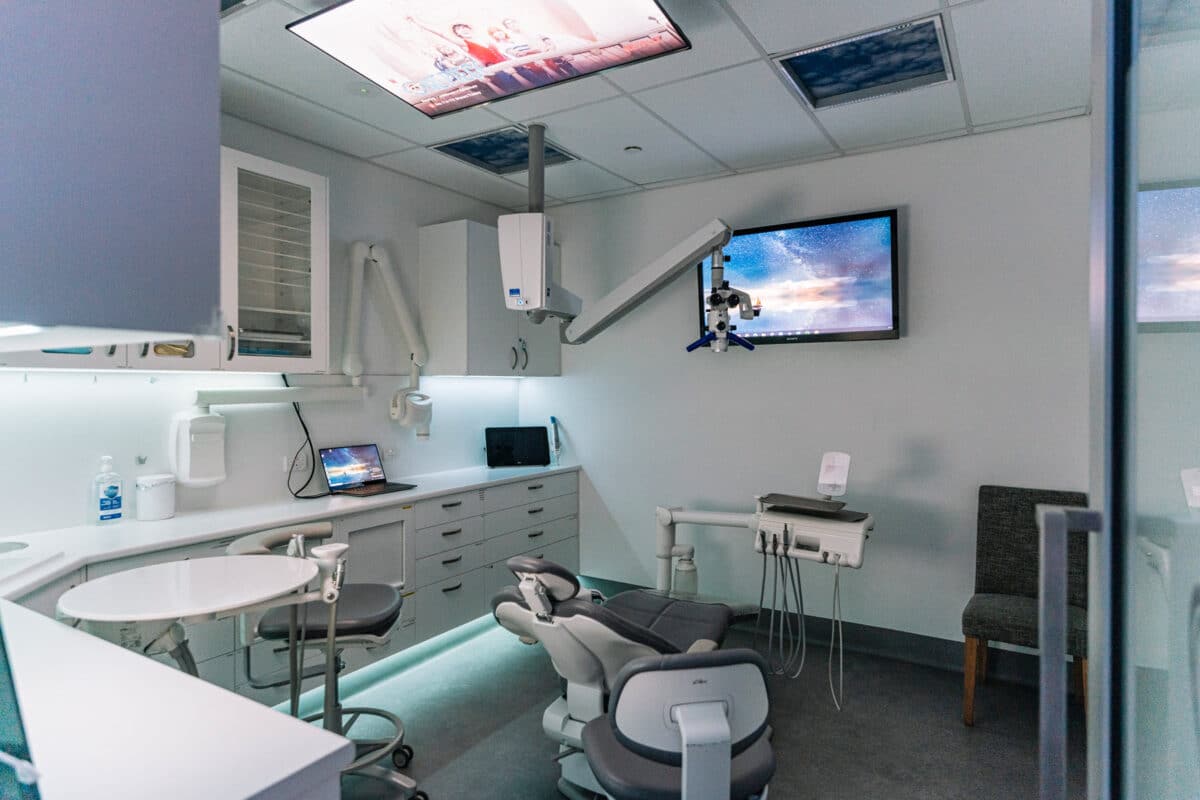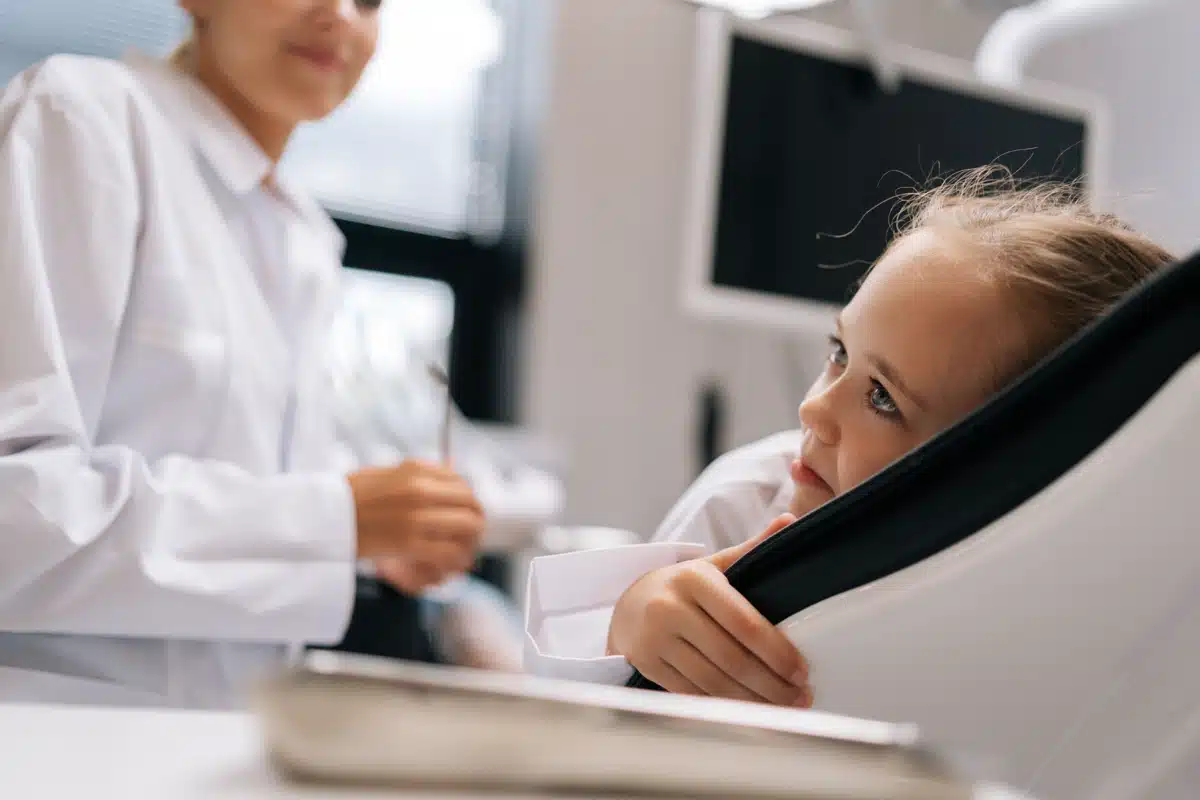Brisbane Dentist for Nervous Patients
Comfort-Focused Dental Treatments for Nervous Patients in Brisbane
In sedation dentistry, dentists tailor dental sedation methods to match patient needs, ensuring safety and comfort. Options include:
- Laughing Gas: First off, there’s laughing gas, or as some call it, happy gas. It’s a breeze. You breathe it in through a mask, and it helps you relax without knocking you out. You’re awake, just less anxious. A light, breathable sedation offering relaxation without full unconsciousness. It is ideal for mild dental anxiety in patients.
- IV Sedation (Twilight Sedation): Then there’s IV sedation, sometimes called “twilight sedation.” This one’s a bit deeper. The anaesthetist will give you medication through a vein, and it should make you feel drowsy and chill. Most times, you won’t remember much of the procedure afterwards, which is a bonus for folks who’d rather not recall the details. Delivered intravenously, IV sedation induces a state of deep relaxation. Patients often remember little of the procedure, making it suitable for moderate anxiety. According to Kids Dental Specialists, IV sedation is not suitable for young children.
- General Anaesthesia (Sleep Dentistry): Lastly, there’s the big gun: sleep dentistry with general anaesthetics (GA). Under GA, you’re completely out. It’s like taking a nap, and when you wake up, everything’s done. This option is top-notch for those who want to be totally unaware of the dental procedure. This method renders the patient fully unconscious. Recommended for paediatric dentistry, dentistry for special children, extensive dental procedures (like dental implants or wisdom teeth removal), severe gag reflex or severe dental phobia.
Each of these methods has its place, depending on how nervous you are and what kind of dental work you’re having done. The goal here is to make sure you feel safe and comfy, no matter which option you go with. No fuss, no muss, just keeping it straightforward and making sure you’re all good every step of the way. Each option is designed to reduce fear and anxiety, ensuring patients can undergo necessary dental treatments comfortably and safely.

How do dentists deal with nervous patients?
When dealing with nervous patients, sedation dentists use several key strategies to reduce anxiety and make dental visits more manageable:
- Dental Sedation Methods: Different levels of sedation (laughing gas for light sedation, IV sedation for deeper relaxation, and general anesthesia for complete sleep) cater to the patient’s anxiety level, ensuring they feel minimal stress during the procedure.
- Desensitization Techniques: Gradual exposure to dental office sounds and sensations helps patients get used to what initially scared them, reducing their overall anxiety about dental treatments.
- Comprehensive Care: Integrating these sedation methods and techniques into practice, dentists tailor their approach to each patient’s needs, ensuring a safe, comfortable, and anxiety-free experience.
By focusing on these strategies, sedation dentists can significantly improve the dental care experience for nervous patients.
How do I go to the dentist with severe anxiety?
For a nervous patient with severe anxiety, the journey to the dentist is more than a physical one. It’s about overcoming mental hurdles.
Prepare before the visit. Start by understanding your fear. It’s not the chair or the tools but what they represent. Learn about your procedure. Familiarity breeds comfort. Next, schedule your appointment at a time when you’re least anxious—maybe mornings work best for you.
Communicate with your dental team. Before your appointment, share your fears. A good dental team that understands dental fear will adjust their approach to suit your needs. This step is about building trust, a cornerstone in managing dental anxiety.
During the appointment, use coping techniques. Deep breathing helps. So does focusing on something else—music or a stress ball in your hand. These aren’t just distractions; they’re anchors to the present, away from your fears.
Regarding sedation, it’s a bridge over troubled waters. Laughing gas eases you into a relaxed state, still awake but distant from fear. IV sedation deepens this, offering a twilight state where anxiety’s grip loosens further. For those with profound anxiety, general anaesthetics can provide a sleep-like state, where the procedure happens without you being aware.
After the visit, reflect on your experience. What worked? What didn’t? This reflection isn’t just about giving yourself credit, which is important, but about building a roadmap for future visits.
The journey for a nervous patient to the dentist is paved with preparation, communication, coping strategies, and the considered use of sedation options. Each step is about taking control back from anxiety, ensuring each dental visit becomes less daunting, and more routine.
What to do if you are terrified of the dentist?
For those who find the dentist’s chair a daunting prospect, a blend of knowledge, communication, and modern dentistry can make a world of difference.
Start by understanding the root of your fear. It’s often a mix of the unknown and past experiences. Educate yourself about the procedures. Knowledge dispels fear.
Talk to your dentist openly. Share your anxieties. They’re trained to handle such situations and can adjust their approach to make you more comfortable, like explaining steps as they happen or setting a signal for breaks.
Use practical strategies to manage anxiety. Deep breathing exercises or focusing on music can help. It’s about finding a distraction that works for you, keeping your mind off the procedure.
Explore sedation options. Laughing gas offers a light, conscious sedation, helping you relax while remaining aware. IV sedation brings you to a twilight state, easing deeper anxieties. For those with intense fear, sleep dentistry under general anaesthetics ensures you’re not conscious during the procedure, waking up after it’s all done.
It’s a path forward, combining your efforts with those of your dental team. Together, making dental care accessible, less stressful, and part of routine health maintenance.
How do I stop shaking at the dentist?
Stopping the shakes at the dentist starts with understanding it’s not just about the body, but also the mind. Here’s how to address both:
- Breathe Deeply: Start with your breath. Deep, slow breathing can calm both your mind and body. It’s simple but powerful. Before you go in, and while you’re in the chair, focus on taking slow breaths. In through the nose, out through the mouth. This can help slow your heart rate and ease the shakes.
- Communicate: Talk to your dentist. Let them know you’re nervous. A good dentist will understand and take steps to make you more comfortable. They can explain what they’re doing, which can help demystify the process and reduce fear.
- Focus Elsewhere: Bring headphones and listen to your favourite tunes or an engaging podcast. This distraction can be a real help, focusing your mind away from the dentist’s work and reducing physical reactions like shaking.
- Use a Stress Ball: Holding and squeezing a stress ball or a similar object can provide a physical outlet for your nervous energy, reducing the likelihood of shaking.
- Consider Sedation Options: If your anxiety is severe, discuss sedation options with your dentist. Laughing gas is a light sedation method that can help you relax without being fully unconscious. IV sedation or sleep dentistry are deeper options that can make the experience easier to handle.
- Practice Mindfulness or Meditation: Regular practice of mindfulness or meditation can help manage anxiety symptoms over time. Even a short daily session can make a difference in how you handle stress and anxiety, including at the dentist.
- Arrive Early: Arriving early can help you acclimate to the dental office environment, reducing the shock to your system when it’s time for your appointment.
By combining these strategies, you address the shaking from multiple angles—both physical and mental. It’s about finding the right mix that works for you, making dental visits a more manageable experience.
Less Intimidating Dental Visits for Patients who are Nervous
To make dental visits less intimidating for nervous patients, we focus on three main strategies:
- Clear Explanation: We break down each option – laughing gas, IV sedation, and sleep dentistry – in simple terms. Knowing exactly what to expect can significantly reduce fear and anxiety.
- Personal Choice: Giving patients the power to choose their dental sedation method empowers them and can make the experience feel more manageable.
- Supportive Environment: We ensure a calm and supportive atmosphere from the moment a patient steps into the clinic until they leave. We’re here to listen, adapt, and reassure, tailoring our approach to each individual’s needs.
We turn to sedation dentistry to make dental visits less frightening for those gripped by fear and anxiety. This isn’t about avoiding the issue. It’s about tackling it head-on with clear, straightforward solutions.
First, understand the fear. It’s real, palpable. We don’t dismiss it; we acknowledge it. Then, we talk. Communication is key. We explain what laughing gas does, how IV sedation feels, and what happens under general anaesthetics. Knowledge dispels fear.
We offer choices. Laughing gas for those who want to stay awake but relaxed. IV sedation for a deeper calm, where the visit is a blur. General anaesthetics for those who prefer to be asleep, waking when it’s all done.
Every step is clear. No surprises. We walk through the process step by step. This builds trust because when patients know what to expect, they feel more in control.
We’re patient. Rushing feeds anxiety. Time is given freely. Questions are answered. Concerns are addressed. This isn’t just about teeth. It’s about people, their fears, their needs.
Comfort comes next—a comfortable chair and a calm environment. Small things matter—a blanket for comfort, music to soothe. Every detail counts.
Follow-up is part of the care we provide. We check in after the visit. How did you feel? What can we improve? Care continues beyond the chair.

How Dental Anxiety Feels
Anxiety grips some patients like a vice when they think about dental treatment, one of the sleep dentists of Brisbane Dental Sleep Clinic says. It’s not just a bit of worry. It’s a powerful force, manifesting in shaking hands, a racing heart, and sleepless nights spent dreading the visit. This fear can be so overwhelming that it stops patients from stepping into a dental office, even when pain becomes unbearable.
Avoidance is a common result. A person might ignore a minor toothache, hoping it goes away, rather than face the dentist’s chair. This delay can lead to more severe issues, turning what could have been a simple filling into a need for a root canal or, worse: tooth extraction.
Communication breaks down too. When patients do brave a visit, their anxiety can make it hard for them to speak about their fears, ask questions, or understand the dentist’s explanations. This silence can lead to misunderstandings and a treatment that feels more like an ordeal than care.
Sedation dentistry offers a bridge over these turbulent waters. Options like laughing gas, twilight sedation, or general anaesthetics allow patients to receive the necessary treatment in a state of calm. These methods don’t just dull the physical sensation; they can also ease the mental torment, allowing patients to get the care they need without the battle against fear.
Anxiety before dental treatments can make people dodge their dental appointments and ignore problems until they get way worse. It’s not just nerves; it’s a full-on blockade keeping them from getting help. Sedation options like laughing gas or IV sedation make dental visits doable by taking the edge off the fear. We make sure people know these sedation options exist and that they’re safe. It’s all about getting the care needed without the panic setting in.
Addressing anxiety is about more than just dental sedation; it’s about building trust. By listening, understanding, and offering a hand to hold (figuratively or literally), we can guide patients through their fears towards a healthier future. It’s a commitment to patient care that acknowledges fear but refuses to let it be a barrier.

Impact of the Fear of Dental Procedures On Nervous Patients
In Sedation Dentistry, we face a truth as old as fear itself. When fear roots deep, it holds back the nervous patient from walking through the dental clinic’s door. This fear isn’t just about the pain or the drill’s sound; it’s about a visceral, primal reaction to the unknown and the memories of discomfort, whether lived or told.
This deep-rooted fear does more than cause a shiver down the spine. It freezes action and keeps patients far from the care they critically need. It’s a barrier, invisible but as tangible as the chair they avoid, that stops them from seeking treatment until, often, it’s too late, and the pain becomes unbearable.
How does this fear affect willingness to seek dental treatment? Imagine standing at a cliff’s edge, knowing you must leap but cannot bring yourself to do so. This paralysis isn’t just a nuisance; it’s a health risk, transforming what could be routine care into emergency dental.
In our dental clinic in Brisbane, we don’t just see this fear; we address it head-on with options like laughing gas, twilight sedation, and sleep dentistry. These aren’t mere comforts; they are bridges over the chasm of fear, designed to carry our patients to a place where dental care is received not in a state of panic but in peace.
If worry about dental visits is holding you back, know comfortable options are waiting for you. Sedation dentistry offers a way to get through dental treatments stress-free, with options like laughing gas, IV sedation, or even sleep dentistry. Interested in learning more about how it can work for you? Give us a call at (07) 3343 4869 or book a consultation to discuss your options. It’s about making dental visits easier for you or your loved ones.




































